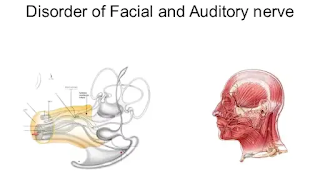Facial nerve
Distribution (branch) and function
Motor to scalp, facial muscles
The sensory, taste in anterior 2/3 of tongue (by Chorda tympani)
Nerve to stapedius muscle
Bell's palsy (facial nerve palsy)
Etiology
- Idiopathic
- Exposure to cold air
- Any injury
- C.V.A
- Brain tumors
- Meningitis and Encephalitis
- May be associated with diabetes, severe hypertension dental anesthesia, 3rd trimester of pregnancy
- Paralysis is caused by compression of nerve fibers by edema in stylomastiod canal...
Symptoms
- Severe pain behind the ear for a day or two
- Unilateral facial paralysis develops rapidly
- Eye on the affected side cannot be closed, water from eyes
- The mouth is drawn over the opposite side. Saliva and fluids may run from the angle of the mouth, causing a loss of sense of taste.
- Affected side feels numb
- Sweating is less on the affected side
- If the lesion is in the middle ear portion, taste on the same side is affected. If the nerve to stapedius is interrupted, there is hyperacuses (painful sensitivity to loud sounds)
Signs
- Paralysis of affected side - both upper and lower part
- Lines of expression are flattened on the affected side; the patient is unable to wrinkle his brow.
- He cannot close his eye; on closing the eyes; the eyeball rolls upwards and outwards, which is called Bell's phenomenon.
- Tongue deviates to healthy side
- When trying to show teeth, the lips do not part on the affected side.
- Whistling is not possible
- Cheeks swell with dizziness; food collects between the teeth and cheek on the affected side.
- EMG: Evidence of denervation after days indicates that there has been axonal degeneration and there will be a long delay before regeneration occurs, and it may be incomplete.
Ramsay Hunt Syndrome
What is it?
Ramsay Hunt condition is achieved by the very contamination that causes chickenpox. After chickenpox clears up, the disease really lives in your nerves. Years sometime later, it could reactivate. Right when it does, it can impact your facial nerves.
Immediate treatment can decrease the condition of facial muscle shortcoming and deafness, otherwise it can cause permanent damage.
Symptoms
- Facial nerve palsy
- An excruciating red rash with liquid filled rankles on, in and around one ear
- Facial inadequacy or loss of movement on a comparable side as the influenced ear
Other symptoms are:
- Earache
- Deafness
- Ringing in your ears (tinnitus)
- Trouble shutting one eye
- A vibe of turning or moving (dizziness)
- An adjustment of taste discernment or loss of taste
- Dry mouth and eyes
Causes
Ramsay Hunt disorder happens in individuals who've had chickenpox. When you recuperate from chickenpox, the infection stays in your body — at times reactivating in later years to cause shingles, a difficult rash with liquid filled rankles.
Ramsay Hunt condition is a shingles' episode that influences the facial nerve close to one of your ears. It can likewise cause uneven facial loss of motion and hearing misfortune.
Risk factors
Ramsay Hunt disorder can happen in anybody who has had chickenpox. It's more normal in more seasoned grown-ups, regularly influencing individuals more seasoned than 60. Ramsay Hunt condition is uncommon in kids.
Ramsay Hunt condition isn't infectious. Be that as it may, reactivation of the varicella-zoster infection can cause chickenpox in individuals who haven't recently had chickenpox or been immunized for it. The contamination can be serious for individuals who have invulnerable issues.
Any individual who's never had chickenpox or who's never had the chickenpox immunization
Any individual who has a powerless insusceptible framework
Babies
Pregnant ladies
Prevention
Kids are presently regularly immunized against chickenpox, which extraordinarily lessens the possibilities of becoming contaminated with the chickenpox infection. A shingles' immunization for individuals age 50 or more established is likewise suggested.
Auditory nerve
The nerve has two components, the auditory (cochlear) and the vestibular components, in which the former is responsible for hearing and the latter one is for maintenance of equilibrium.
Etiology (damage)
Acoustic neuroma (C.P. angle tumor)
Meningitis
Toxins
Meningitis
Toxins
- Kanamycin
- Streptomycin
Symptoms/Signs
Tinnitus
Deafness
Vertigo: Sensation of training of the environment or of the patient himself.
Etiology
Ocular lesions: Diplopia
Cerebellar lesions
Brain stem lesions:
- Syringobulbia
- Medullary infarction
- Insufficiency of basilar artery
Lesion of vestibular nerve: Acoustic neuroma (Auditory nerve tumor)
Aural lesion
Otitis media
Meniere's syndrome
Labyrinth injury
Toxins
- Streptomycin
- Quinine
- Salicylates, diuretics, caffeine
Anxiety neurosis
Meniere's syndrome: It is characterized by vertigo, tinnitus and progressive nerve deafness.
Etiology
Unknown
It is usually associated with expansion of the endolymphatic system due to endolymph proliferation.
Migraine may be present with it.
Local infection of teeth and tones; allergies or sucking or sniffing
Vitamin C deficiency
Symptoms
Progressive deafness
Tinnitus
Vertigo: Difficult to start suddenly; the patient may collapse
Nausea and vomiting
Other automatic motions
Signs
Rotatory nystagmus
Ataxia
Treatment
During attack, patient must lie perfectly still
The labyrinth may need to be torn down or the eighth sensor separated...


Post a Comment